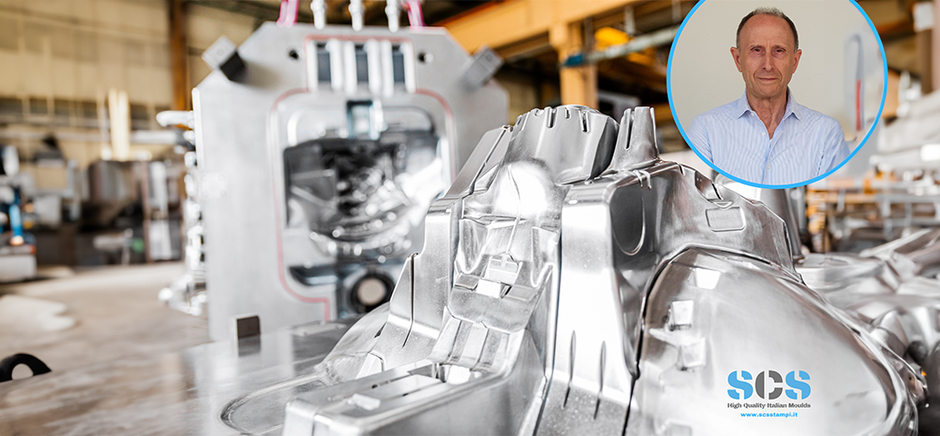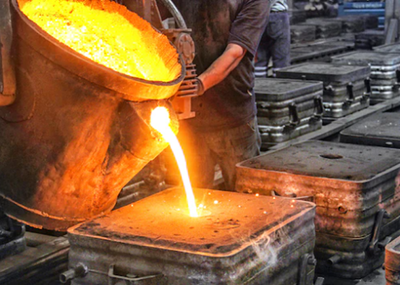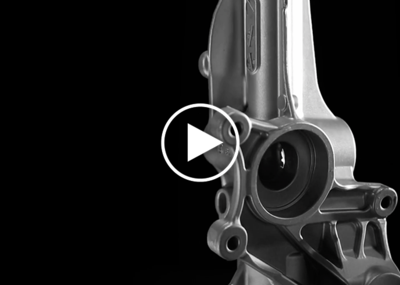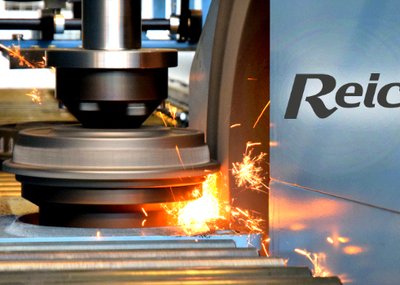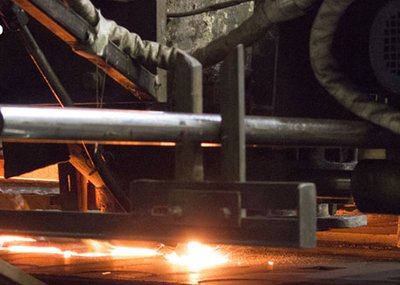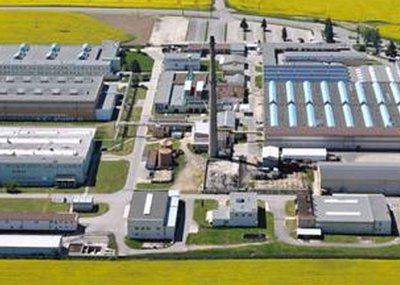During an on-site appointment at SCS Stampi in Pontoglio (BS) Italy, I was able to meet the entire owner family, Mario, Giovanni and Ivan Rodegari.
It is always something special when several generations are around the table, who have built up a company and are leading it into the future together.
SCS Stampi is a well-known manufacturer of tools and precision mechanics for die casting, gravity die casting and low pressure die casting. The company has more than 40 years of experience and, with around 40 employees, supplies renowned customers via OEM, Tier 1 and Tier 2 in Europe, the USA and Mexico.
The challenges in the industry worldwide are currently particularly diverse, with strong competition, transformation of drives and shifts in the markets. Naturally, the main focus of a successful medium-sized company is on optimum quality, functionality and service life, but let's ask the gentlemen themselves:
FP: Mario Rodegari, you are the founder of the company and still work in the family business on a daily basis. How did SCS start and how have the requirements of the industry changed?
In 1961, at the age of 14, I began my career path as a milling worker for a company producing vises.
The second job, which came after seven years, introduced me to the world of molds and allowed me to meet the three partners with whom, in 1981, we established SCS Srl - Società Costruzione Stampi.
During the day I was in charge of the production aspect, in the evening of the administrative and management aspect, planning future investments and business strategies.
A few years after the company was founded, the desire to constantly innovate prompted me to acquire all the shares, thus becoming the sole owner.
Thanks to constant economic investments, the company was able to structure itself to make larger and larger molds, opening up new market opportunities.
This led us, in the mid-1990s, into the important #automotive sector.
The die casting mold making industry has undergone several changes and developments from the early 1980s to the present.
In recent decades, there has been an increasing integration of advanced technologies and automated systems in mold design and manufacturing. The use of advanced CAD/CAM software, virtual simulation, and rapid prototyping have greatly improved efficiency and accuracy in mold design. New materials have been introduced, with improved wear resistance, durability and thermal conductivity characteristics. 3D printing ( with laser sintering of metal ) has begun to play an increasingly important role in prototyping and manufacturing of mold components with complex geometries. This technology allows greater flexibility in design and can reduce development time. The needs of the die casting industry have placed a greater emphasis on quality control; advanced nondestructive testing technologies and real-time monitoring systems have been implemented to ensure compliance with customer-specific requirements.
Increasing attention has been paid to eco-sustainability, with significant efforts to reduce waste, optimize processes and use more environmentally friendly materials.
S.C.S. Srl, also pays great attention to eco-sustainability and has equipped itself with a photovoltaic system that has enabled it to reduce the use of energy derived from fossil fuels. Not least every year, we receive recognition from ECOVADIS for our achievements in terms of Eco-sustainability. With the advent of globalization, many companies in the industry have expanded their presence internationally, facing challenges and opportunities related to cultural diversity, global supply chain management, and changes in trade regulations.
Customer needs have become increasingly specific, requiring greater customization of molds. Companies in the industry need to be more flexible and able to adapt quickly to changes in market demands.
Today, as then, I pursue business goals with determination, because, as I like to repeat, " nothing in the world was done without passion."
I have deep faith in the future. With the support of the second generation, represented by my sons Ivan and Giovanni, together with our valued partner Roberto and the entire team of collaborators, I am confident that the passion and commitment that have marked our path will continue to be the driving force behind our growth and the success that lies ahead.
FP: You supply foundries, which then supply different industrial segments with your tools. Which products and which industries are served with your molds? What are the biggest challenges in terms of standards and delivery, how developed are digitalization issues in mould making?
S.C.S. has always sought to differentiate its equipment productions.
The sectors for which molds are made are automotive for 85%, the remaining 15% is for the industrial sector, furniture.
Years ago, we decided not to devote ourselves exclusively to the production of tooling for internal combustion engine components; we put our focus on structural body components, " Body in white."
Meeting quality standards is crucial in the industry. Ensuring that molds meet stringent standards and technical specifications is essential to the production of reliable die-cast components that meet customer requirements.
Many applications require very tight tolerances and a high degree of precision. Maintaining these tolerances is a challenge that requires expertise.
The use of advanced materials in molds is crucial to address the challenges associated with the extreme conditions and wear to which the molds are subjected during the die-casting process. These materials enable the manufacture of stronger and more durable molds, thus helping to improve efficiency and quality in production while ensuring optimal mold performance over time.
Many companies require timely deliveries to avoid disruptions in the production chain. Delivery planning and management are critical to meeting customer expectations.
Digitization in mold making is increasingly impactful; advanced CAD/CAM software is being used, enabling more efficient mold design, reducing errors and accelerating the development process.
Virtual simulation allows mold behavior to be tested under simulated working conditions before physical production, reducing the need for physical prototypes and optimizing design.
The implementation of real-time monitoring systems makes it possible to track the status of molds during production, improving quality management and reducing the risk of defects.
FP: You supply customers in Europe, the USA and Mexico. How are the markets developing and are there different customer requirements?
Markets in Europe, the United States, and Mexico can differ significantly in terms of regulations, quality standards, customer preferences, and manufacturing approaches.
Adapting to these differences is essential to meet the specific needs of each state.
Each region may have specific regulations and standards for products and industrial processes.
It is critical to respect and comply with these regulations in order to operate legally and to meet customer expectations.
Customer needs may vary by state, industry, and specific applications.
Local market competition can influence business strategies and product differentiation. Understanding the local competitive landscape is essential to remain competitive.
Economic conditions and growth trends in different states can influence demand for die-cast products and, consequently, sourcing and production strategies.
FP: As an essential component for the cast part, the mold is also part of the design process. As a toolmaker, when do you start sitting at the design engineers' table together with the foundrymen?
The sooner the better! Die makers can already sit at the design table at the initial planning stage. At this stage, the basic requirements and specifications for the mold are defined, based on the needs of the die casting process and the design requirements of the component.
Collaboration continues during concept development, when designers establish design details and moldmakers help ensure that the mold can be made efficiently and accurately.
At the detailed planning stage, production managers and designers work closely together to refine all aspects of the mold. At this time, details on feasibility, material selection, and specific requirements for mold fabrication can be discussed.
After the mold is made, S.C.S. and the foundry conduct sampling together to verify and ensure that the equipment meets the requirements and that the molding process runs smoothly.
The company has outlined a clear strategy to penetrate the European market for the sale of die casting molds. This involves seeking new business opportunities, identifying key industrial sectors and establishing a solid presence in strategic regions. The goal is to consolidate the position in the European market by increasing market share and acquiring new customers.
FP: You have a lot of experience and an impressive machine park. Please give us a brief overview of your vertical range of manufacture and what expansion possibilities are there for your company, up to what mold size can you offer?
S.C.S. has :
- 17 3- and 5-axis machining centers for roughing and finishing on parts with a maximum size of 3,000 X 2,500 mm.
- 3 drilling centers that enable us to obtain parts with horizontal, cross and inclined holes up to a diameter of 40 mm for a length of 1,450 mm.
- 2 horizontal CNC lathes.
- 2 plunge erosion plants with tank dimensions up to 2,310 X1,330 X 800 mm.
The maximum overall dimensions of the mold holder we can make are 2,200 X 2,500 mm.
The maximum total weight of the mold we can produce is 55 Tons in total.
FP: In January 2024, the largest trade fair for light metal EUROGUSS will take place again in Nuremberg. You will of course be taking part as an exhibitor, what can visitors expect to see at your stand?
Euroguss is an excellent opportunity for networking. Visitors can meet industry professionals, other manufacturers and experts to discuss the latest developments and opportunities for collaboration.
Our TEAM of sales and technical people, will be on hand to provide technical advice on mold design, materials, tolerances and other relevant issues.
Visitors may have the opportunity to discuss their specific projects and receive personalized advice.
Last but not least, you can reserve the day, time and contact person with whom you would like to make an appointment; find directions on our Linkedin posts referring to Euroguss 2024.
Don't have Linkedin? Go to our page at www.scsstampi.it to the contact section and send us an email.
We look forward to meeting you again at EUROGUSS in Nuremberg in January 2024, thank you very much for the informative discussion and wish you, your family and your employees all the best!

